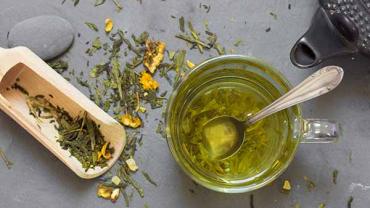
People have noted that while coffee makes them jittery, green tea—despite its caffeine content—has a calming effect. It’s possible the difference is due to green tea having substantially less caffeine than a typical cup of coffee, but maybe there’s an additional factor at work. The presence of L-theanine in green tea might be responsible for balancing some of the stimulating effects of caffeine. As implied by its technical name, N-ethyl-L-glutamine or γ-glutamylethylamide, theanine is a derivative of the amino acid glutamine. It crosses the blood-brain barrier via the large neutral amino acid transport system and is believed to increase brain levels of serotonin, dopamine, and GABA.
L-Theanine is found almost exclusively in tea (especially green tea) and one mushroom species. After crossing the blood brain barrier, it inhibits the binding of glutamic acid to glutamate receptors in the brain “and has been considered to cause anti-stress effects by inhibiting cortical neuron excitation.” Studies in healthy adults show that orally administered L-theanine reduces anxiety and attenuates blood pressure increases under conditions of physical or psychological stress. In a study looking at the effects of L-theanine on the stress response (using a mental arithmetic task as an acute stressor), compared to placebo, L-theanine reduced heart rate and salivary immunoglobulin A responses (S-IgA) in the subjects. Researchers attributed these effects to an attenuation of sympathetic nervous activation. Animal studies suggest that L-theanine increases brain levels of various neurotransmitters and that it has micromolar affinity for AMPA and kainite receptors (as an antagonist) and NMDA receptors (as an agonist).
A human EEG study showed that, compared to water, 50mg powdered L-theanine in a tea preparation significantly increased alpha brain wave activity, indicating that it may relax the mind without inducing drowsiness. The study authors noted that L-theanine could be useful for “achieving a relaxed but alert mental state via a direct influence on the central nervous system.” Relaxed but alert: this is the opposite of the “tired but wired” feelings many patients present with. Perhaps there’s a role for L-theanine in calming some of those frayed nerves without inducing unwanted sleepiness.
L-theanine is probably best known for its relaxation and potential anxiolytic effects, but it may also have beneficial effects for those with major depression. In a study of 20 adults with major depressive disorder who took L-theanine for 8 weeks (250mg/day) in addition to their existing medication regimen, significant improvements were recorded in depressive symptoms, anxiety, sleep disturbance, and cognitive function. However, it should be noted that this was an open-label study, so there was no placebo to compare to.
L-theanine was also shown to have a modest-to-moderate beneficial effect in patients with schizophrenia and schizoaffective disorder. Added to subjects’ existing antipsychotic treatments, compared to placebo, L-theanine at 400 mg/day for 8 weeks was associated with reduction of anxiety and general psychopathology. General functioning, side effect, and quality of life measures were not affected by L-theanine augmentation, and the compound was found to be safe and well-tolerated.
Because L-theanine is found in tea, which also contains caffeine, studies have investigated their effects independently and together in order to elucidate their individual properties and any synergies or antagonism between them. In a review of the effect of green tea phytochemicals on mood and cognition that included only human intervention trials, caffeine was found to “improve performance on demanding long-duration cognitive tasks and self-reported alertness, arousal, and vigor,” with effects noted with as low a dose as 40 mg. Administered alone, L-theanine (starting at 200mg) improved self-reported calmness, relaxation, and tension. When taken together, caffeine and L-theanine were found to improve performance in alertness and attention-switching tasks, but less than caffeine alone. It appears that L-theanine may reduce some of caffeine’s effects, and vice-versa.
On the whole, research supports synergy between theanine and caffeine. According to a review on the psychological effects of caffeine and theanine, “caffeinated tea, when ingested at regular intervals, may maintain alertness, focused attention, and accuracy and may modulate the more acute effects of higher doses of caffeine. These findings concur with the neurochemical effects of L-theanine on the brain. L-theanine may interact with caffeine to enhance performance in terms of attention switching and the ability to ignore distraction…”
As many people can attest, coffee addiction is real. Perhaps by switching to green tea—not easy, admittedly!—those who experience negative effects from the caffeine load might be able to get some of the desired stimulatory benefits without the drawbacks.